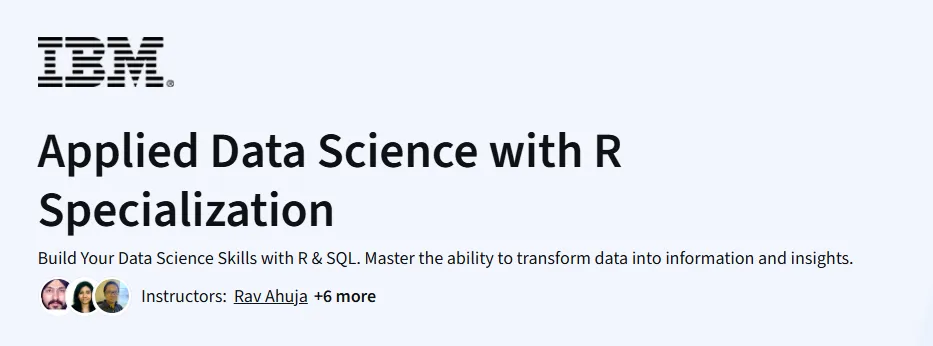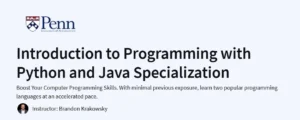What will you learn in Applied Data Science with R Specialization Course
Build foundational knowledge in R programming tailored for data science tasks.
Perform statistical data analysis, data wrangling, and visualization in R.
Work with real-world data using tidyverse packages and advanced visualization libraries.
Build machine learning models and understand data modeling pipelines in R.
Program Overview
Course 1: Introduction to R Programming
⏱️ 2 weeks
Topics: R syntax, data types, functions, conditionals
Hands-on: Write R scripts, use control structures, manage packages
Course 2: Data Wrangling with R
⏱️ 3 weeks
Topics: Data manipulation with
dplyr,tidyr, and data cleaningHands-on: Load, clean, transform datasets using tidyverse
Course 3: Data Visualization in R
⏱️ 3 weeks
Topics: Visualizing with
ggplot2, plot customizationHands-on: Create bar plots, histograms, scatterplots, and advanced graphics
Course 4: Machine Learning with R
⏱️ 4 weeks
Topics: Supervised and unsupervised learning, model evaluation
Hands-on: Build decision trees, random forests, and clustering models
Course 5: Data Science Capstone Project with R
⏱️ 3 weeks
Topics: End-to-end project using real datasets
Hands-on: Apply R skills to analyze, model, and visualize data
Get certificate
Job Outlook
R is in high demand for roles such as Data Analyst, Statistician, and Research Scientist.
Ideal for candidates entering roles in academia, healthcare, finance, and policy research.
Median salary ranges from $65K–$115K depending on role and experience.
R remains a top skill for statistical analysis and data visualization tasks.
Explore More Learning Paths
Expand your R-based data science capabilities with complementary courses designed to strengthen your analytical thinking, enhance your workflow, and prepare you for more advanced or leadership-oriented roles in data.
Related Courses
1. Tools for Data Science Course
Build confidence with essential tools like Jupyter, GitHub, and RStudio to streamline your data analysis and prepare for real-world projects.
2. Data Science Methodology Course
Discover the structured process used by experts to define business problems, plan analytical approaches, and deliver impactful data solutions.
3. Executive Data Science Specialization Course
Develop leadership skills that help you manage data teams, oversee analytics projects, and guide data-driven decision-making across organizations.
Related Reading
What Is a Data Scientist?
A clear, beginner-friendly breakdown of the role, skills, tools, and career path of data scientists—perfect for learners building expertise in R.
Specification: Applied Data Science with R Specialization Course
|
FAQs
- No prior R programming experience is required; the course introduces R from scratch.
- Basic familiarity with computers and data concepts is helpful but not mandatory.
- Exercises guide learners step-by-step through coding and analysis tasks.
- Supplemental tutorials can accelerate understanding for complete beginners.
- Hands-on projects help build confidence as learners progress.
- The course uses real-world datasets to practice data cleaning, visualization, and modeling.
- Learners perform statistical analyses and exploratory data analysis (EDA) in R.
- Projects simulate scenarios similar to those in professional data science roles.
- Guided labs reinforce concepts through practical application.
- Hands-on work helps learners build a portfolio to demonstrate their skills.
- Provides foundational skills in data analysis, visualization, and statistical modeling using R.
- Learners gain practical experience applicable to data analyst or junior data scientist positions.
- Completion can strengthen resumes and portfolios for job applications.
- Additional learning in machine learning or big data may complement the course.
- Projects demonstrate applied problem-solving abilities to potential employers.
- R is widely used for statistical analysis, visualization, and reporting in many industries.
- Skills in data wrangling, visualization, and modeling are transferable to other analytics platforms.
- Applied exercises simulate workflows common in enterprise environments.
- Understanding R fundamentals makes it easier to learn additional data science tools later.
- Mastery of these skills enhances employability for analytics or research roles.
- Estimated completion is around 4–6 months at a part-time pace.
- Weekly commitment of 4–6 hours is generally sufficient for lectures and exercises.
- Regular practice in coding, visualization, and modeling reinforces learning.
- Revisiting assignments or exploring additional datasets may require extra time.
- Consistent engagement ensures learners develop both conceptual understanding and practical R skills.





